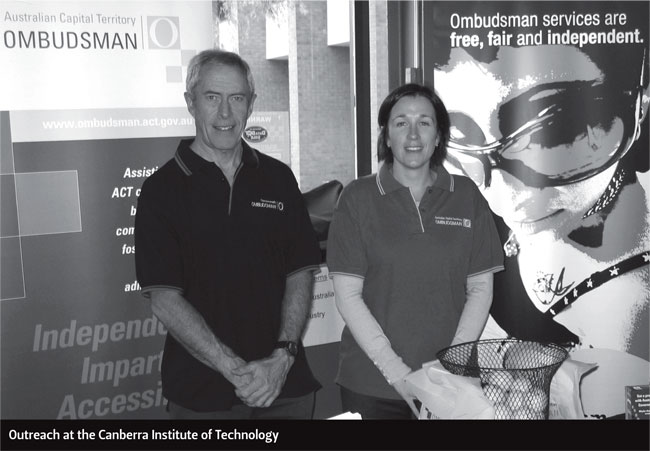Section B: Consultation and scrutiny reporting
Section B: Consultation and scrutiny reporting
- Community engagement
- Legislative Assembly Committee inquiries and reports
- Legislation report
Community engagement
The Ombudsman's office maintains contact with the community in a variety of formal and informal ways. This aspect of our work is important in raising public awareness of the right to complain to the Ombudsman and building confidence in the role of the office in managing and investigating complaints about ACT Government agencies and ACT Policing.
During 2008–09 we:
- participated in Law Week with a stall at the Law Market day in Civic
- had a stall at the Youth Week Expo in Civic
- had a stall at Summernats
- conducted outreach activities during Orientation Week at the University of Canberra, the Canberra Institute of Technology and the Australian National University
- conducted a complaint clinic at the Aboriginal Justice Centre
- promoted the role of the Ombudsman at the ACT Multicultural Festival
- made a presentation on the role and responsibilities of the Ombudsman to a Rotary meeting.

Late in 2007–08 we commissioned an independent market research company to undertake a survey of complainants, including people who had made a complaint about an ACT Government agency or the AFP. The results of that survey and initiatives we have implemented are described in Section A: Performance and financial management reporting.
In 2007–08 the office established the Dennis Pearce Top Performance in Administrative Law Prize at the University of Canberra. The prize, named after the first ACT Ombudsman, Prof. Dennis Pearce, is awarded to the student who receives the highest grade in the administrative law unit in the University of Canberra's Law School. The 2008–09 winner of the prize was Mr Russell Boyd.
Legislative Assembly Committee inquiries and reports
The Standing Committee on Justice and Community Safety considered the ACT Ombudsman's Annual Report 2007–2008 in its Report on Annual and Financial Reports 2007–2008 (Report 1), tabled in the Legislative Assembly on 25 June 2009. The Committee made no recommendations in relation to the ACT Ombudsman.
Legislative reports
The role of the ACT Ombudsman is performed under the Ombudsman Act 1989 (ACT). The Ombudsman also has specific responsibilities under the Freedom of Information Act 1989 (ACT) and is authorised to deal with whistleblower complaints under the Public Interest Disclosure Act 1994 (ACT).
ACT Policing
Members of the AFP provide policing services for the ACT under an agreement between the Commonwealth and ACT Governments. Members of the AFP assigned to the AFP's ACT region are engaged in community policing duties under the ACT Chief Police Officer, who is also an AFP Assistant Commissioner.
The AFP deals with complaints under Part V of the Australian Federal Police Act 1979. Complaints received by either the AFP or the Ombudsman prior to 30 December 2006 continue to be dealt with under the provisions of the Complaints (Australian Federal Police) Act 1981 (Cth).
Responsibility for investigating complaints rests with the AFP. AFP line managers are required to deal with minor matters. More serious matters are notified to the Ombudsman's office. The categorisation of complaints into minor or serious matters was agreed on by the AFP Commissioner and the Ombudsman and set out in a legislative instrument. Primary responsibility for resolving more serious matters remains with the AFP. The Ombudsman may investigate complaints about the AFP under the Ombudsman Act 1976 (Cth). In general, complainants are expected to raise their complaints with the AFP in the first instance before the office will consider investigating them.
In addition, the Commonwealth Ombudsman, also designated as the Law Enforcement Ombudsman under the Ombudsman Act 1976 (Cth), is required to review the handling of complaints and conduct issues in the AFP at least annually and may investigate conduct issues on his own initiative. The notification of all serious complaints received by the AFP alerts the Ombudsman to matters that may warrant investigation.
On 19 August 2008 the Crimes (Controlled Operations) Act 2008 (ACT) came into effect. This Act allows ACT Policing to conduct controlled operations in the ACT and gives oversight to the Ombudsman. A controlled operation is a covert operation carried out by law enforcement officers under the Crimes (Controlled Operations) Act for the purpose of obtaining evidence that may lead to the prosecution of a person for a serious offence. The operation may result in law enforcement officers engaging in conduct that would constitute an offence unless authorised under this Act. When the provisions of the legislation start to be used, the Ombudsman must, from time to time and at least once every 12 months, inspect the records of the AFP to determine the extent of compliance with this Act by the agency and law enforcement officers of the agency.
A Child Sex Offenders Register was established in the ACT as a requirement of the Crimes (Child Sex Offenders) Act 2005 (ACT) (the Act). One of the Ombudsman's functions under the ACT Ombudsman Act is to monitor compliance with Chapter 4 of the Act by the ACT Chief Police Officer and other people authorised by the Chief Police Officer to have access to the register.
